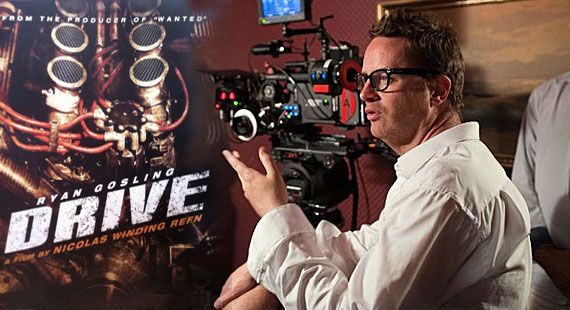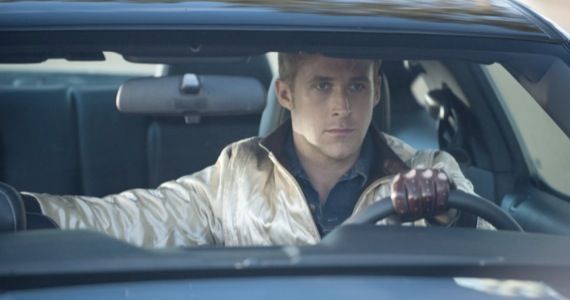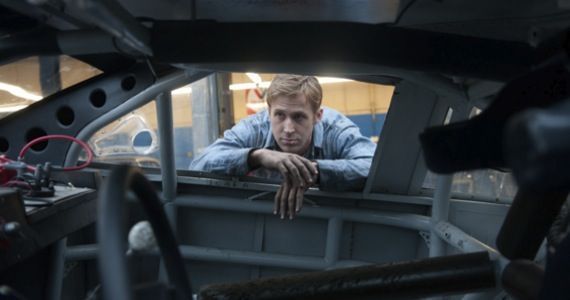With movies like Bronson and Valhalla Rising, Nicolas Winding Refn has proven himself to be one of the leading auteurs working in film today. In his latest film Drive, the Danish-born director continues to explore themes of masculinity and the nature of violence, pushing the limits of genre filmmaking and perhaps, finally launching him into mainstream recognition.
During a press tour in support of Drive (a first for the director), I had the opportunity to talk with Refn about his unique style, his close working relationship with actor Ryan Gosling, and his future projects, including the remake of Logan's Run.
Fans of Refn's work will note that the director often uses graphic violence in his films - and Drive is no exception (as demonstrated in the red band trailer for the film). In our interview, Refn explained why he incorporates violent imagery into his movies, and also the risk of using violence indiscriminately.
Joking that someone once described him by saying "half of you is The Texas Chainsaw Massacre and the other half is It's a Wonderful Life," Refn said that the characters in his films "strive for something, but they don't know what it is."
"In each film, the protagonist is forced to have a moral stand. That moral stand then ends with a consequence. You cannot live life without consequences. Whenever you do something, there will be a consequence. Just like violence only works if there's a consequence. There's a build-up. You can't just be violent for violence's sake, because it's not emotionally engaging, so it becomes bad pornography.
If you see too much of it, you start to disengage from it, and that's where violence can become dangerous for the psyche, because it no longer has any meaning. Like people who get addicted to pornography, the sense of empathy and emotion start to deteriorate within them - it's a frightening effect."
Ryan Gosling's character, who is simply referred to as Driver, is an excellent example of the kind of male lead that Refn often features in his films. In a movie world filled with big-budget spectacles about superheroes, Refn and Gosling decided that they wanted Driver to be a hero as well or, rather, for him to believe that he was a hero.
"'Drive' is about a man who is half-man half-machine. He has no middle ground. There's no flip. There's only sunup and sundown. By night he wears other clothes, he's mentally in a different place. By day, he's a human being. By night, he's a hero. But those two worlds always conflict.
And it's through the circumstances of meeting a girl who needs a human being that he then represents for her, and when she needs a hero, he becomes a hero. But the consequences, the moral dilemma that's he's placed in, puts him in a situation where his transformation starts and ends with the inevitable: that he was always meant to be a superhero."
But there's a question as to whether or not Driver really understands what being a hero means in the real world. The character is driven (pun intended) to achieve his goal, but the means by which he finally does succeed are extremely questionable. Refn addressed the surreal and often dream-like nature of Driver's "heroic" actions.
"His life becomes his own movie. He's a stuntman who stands up playing a character in his own film. He plays the hero in a movie that he projects as a stunt double... Driver is a psychotic man, but he's not psychopathic. He's psychotic. It means that he has a lot of empathy. He just sees the world in a different light."
Though his thoughtful and philosophic answers may suggest otherwise, Refn claims he doesn't do analytical filmmaking. When asked whether the violence in Drive was a statement on American obsession with violence, Refn described himself as a "fetish person."
"I make films purely based on what I would like to see, never analyzing it. Sometimes thinking about it structurally in a storytelling sense, but I never question my fetish. I just visualize it and that's all I can do. I'm not the greatest filmmaker in the world. There are much better filmmakers than me. But the kinds of films I make, I'm the best at. I can only make what I can make."
Refn then went on to explain why having a star like Ryan Gosling supporting his unique style was so important in helping to shield him from outside interference.
"That was what was so good about Ryan and I. He would protect me. He was my hero. As a person he was my hero. He was also, as my lead actor, a hero. And that of course that created a very strong bond between us, because it's a very emotional way to work. It's similar to when John Boorman made Point Blank. Lee Marvin insisted on John Boorman coming from England to do Point Blank. Or with Steve McQueen wanting Peter Yates to do Bullitt."
Regular Screen Rant readers will recall that Refn and Gosling are working together again on the remake of the sci-fi classic Logan's Run. Refn says they have started writing the script for the film, but they won't get to the movie until they complete a movie called Only God Forgives.
With Logan's Run being a much higher-profile project for Refn (Drive is his biggest film to date, at a mere $16 million budget), I asked whether he was concerned that he would be able to make his kind of movie while dealing with the expectations of a big-budget remake.
"I'm actually looking forward to it. I like the people at Warner Bros. My job is to make the best movie that I can, and everybody else believing that it is... Again, when a director has his leading man [Gosling], and all he needs is a structure, then everything else will come."
Refn went on to compare his relationship with Gosling to other famous director-actor pairings from classic cinema, including Alfred Hitchcock and James Stewart; Sergio Leone and Clint Eastwood; and Martin Scorsese and Robert DeNiro.
"A director needs his leading man, and a leading man needs his director. If those two things work, then everything else is secondary, because you have the heart of what you do."
--
It will be very interesting to see how general audiences react to Drive, which is as much of an arthouse film as it is a thriller. Talking with Refn in person, I felt like I was listening to a truly visionary filmmaker and I can see why Ryan Gosling has decided to align himself so closely with the director. Hopefully the Logan's Run remake continues to come together and Refn's unique approach to filmmaking isn't hampered by the Hollywood machine.
If you're a fan of Refn's previous films or of Ryan Gosling, check out Drive when it hits theaters on September 16th - and check back with us for our review of Drive later this week.



